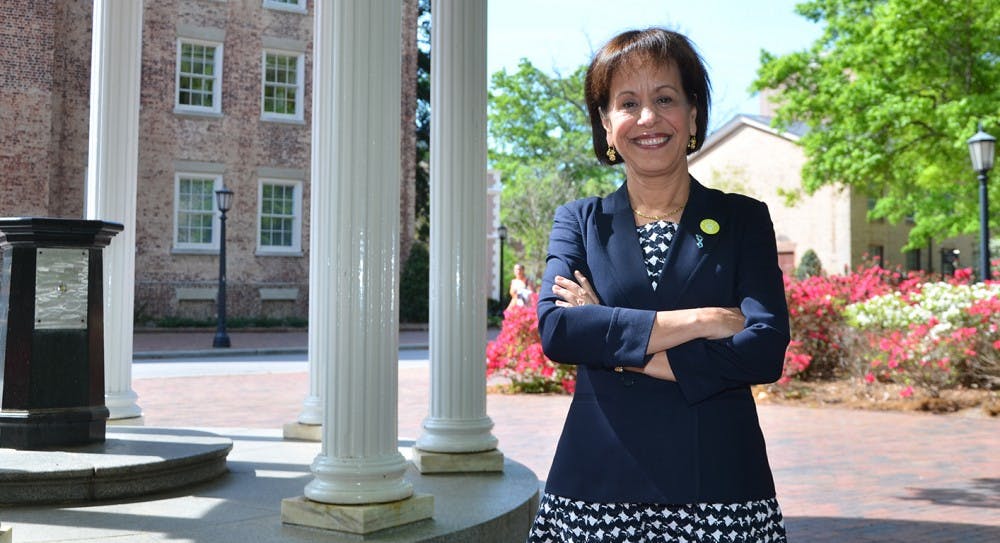“The only negative is that Carol Folt has balked all of our requests to meet and talk to her,” Chandler said. “She was very responsive at the Board of Trustees meeting. She was positive then but we haven’t found her firm opinion.”
“As someone with an environmental background, you would think she would be someone we could meet with.”
Olivia Abrecht, a member of Student Action with Workers, which pushes for brands that do business with UNC to sign the Accord on Fire and Building Safety in Bangladesh, said the group felt a similar wall with South Building.
The first time they met with Folt was after waiting three hours in her office, she said. The second time, the activists brought two garment workers from Bangladesh to share their experiences.
“It was a very emotional meeting and Chancellor Folt refused to even have a dialogue about what was weighing on her decision,” Abrecht said.
On the day before a planned sit-in protest, UNC announced the UNC system would take control of the licenses decision.
Many students’ causes are up to other governing bodies, Folt said.
Jacob Morse, who chairs the student advisory committee to the chancellor, said she’s taken a strong stance on issues like the 12.3 percent tuition hike for out-of-state students, he said.
“Coming into a place that is as big as Carolina and is experiencing as many challenges as it is, it makes sense for the leadership to step back and get the big pictures.”
The spotlight has been on UNC once again since former African and Afro-American Studies department chairman Julius Nyang’oro was indicted. And UNC began to make headlines again after Willingham’s claims about athlete literacy were published on CNN.
When Folt and Dean arrived on campus, many faculty members were expecting to move beyond athletics, said faculty chairwoman Jan Boxill.
“I think we were expecting a new page, but I’m not sure we got it. There’s not one faculty council meeting I’ve had in my three years that athletics isn’t brought up — either I do, the chancellor does, or (faculty athletics committee).”
To get the day's news and headlines in your inbox each morning, sign up for our email newsletters.
UNC has been criticized for its response to the claims by everyone from professors to the Government Accountability Project — at a Faculty Council meeting in January, Dean called Willingham’s findings “unworthy of our University” and a “travesty.”
He said he wouldn’t change the basics of his response.
“To be completely honest with you, there were some things I wish I hadn’t said,” he said. “I feel very strong about what happened and probably I let my enthusiasm run away with me a couple times.”
Dean said it took him only a few weeks on the job to realize the complexities of college athletics, which was when he put together a working group to look at every process associated with athletics.
“Your reputation always lags behind the actuality. When things started to go wrong here, our positive reputation persisted for a while and we got more credit than we deserved,” he said. “Now that we’ve made all these changes, our reputation hasn’t caught up. Over the long run, it will work out.”
In February, Folt and Dean commissioned an independent review into misconduct by attorney Kenneth Wainstein.
Former Executive Vice Chancellor and Provost Bruce Carney said he was interested in the review but doubted it would come to conclusions different than the nine other reports. He said he wasn’t sure the headlines would stop.
“The key question people are raising is whether there was collusion between athletics and one department,” he said. “I’ve seen no sign of that. Some people are convinced there are more sinister sides to the story than have been revealed. I don’t feel that way.”
Carney said there is no way to control the media firestorm, but the communications strategy in place is working.
“They have to keep responding and continue to point out what the University is doing to help out athletes,” he said. “There are number of students who have problems; the University has to provide resources to help those students.”
A self-described glass-half-full person, Folt didn’t mention any of the Willingham stories as her hardest day in office — instead, she said she hasn’t had one.
“I might have a day when there’s some news breaking that is really difficult, and I have to think, ‘OK, what is underlying this? ‘What are we doing in this area?’ ‘What can we learn about it?’... That can be both challenging but it is also what we’re supposed to do,” she said.
“If you let things that happen in the moment be the driver of what you do, you would be failing. I’m very lucky that much of what I do is about today, but a lot of it is about tomorrow.”
university@dailytarheel.com



